Impact and Innovation at Bangor University
Bangor University has rewarded its finest and most innovative academics at the University’s second annual Impact & Innovation Awards.
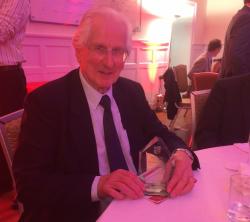
Dr Ray Davies at the Impact and Innovation AwardsThese Awards recognise outstanding research and enterprise activities from across the institution, which have succeeded in benefiting the wider economy and society.
This year the Awards were extended to four categories: Best Cultural and Societal Impact, Best Impact on Public Policy and/or Public Services, Best Business Impact and Best Innovation.
The winners were: The Photonics Academy of Wales @Bangor (PAWB) at the School of Electronic Engineering, the Centre of Health Economics & Medical Evaluations, the BioComposites Centre and the School of Chemistry.
Commenting on the event, Professor John G Hughes, the University’s Vice-Chancellor said:
“The research and enterprise activities carried out at Bangor University play an important part in improving the economic and social wellbeing of Wales. Impact is at the heart of our mission and firmly embedded in our research strategy. At Bangor University we are combining knowledge creation of international excellence with innovation and communication to ensure all areas of our research benefit others.
The projects highlighted by these awards illustrate the positive impact that the University has on the economy and society.”
Professor Jo Rycroft-Malone, Bangor University’s Director of Research said:
“The purpose of our impact awards is to showcase the University’s work and celebrate our successes. In this, the second year of the Awards, we deliberated on 40 applications. The competition was extremely strong, and we’re celebrating and recognise the wealth of talent we have across our university. Congratulations to our finalists, their impact stories will serve to highlight the difference that Bangor University research and innovation can make.”
The Award for the Best Cultural and Societal Impact went to The Photonics Academy of Wales @Bangor (PAWB).
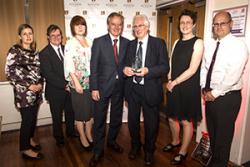 Left-right: Louise Jones, Photonics KTN Network; John Blomfield, Qiopitq; Laurel Hopkins, @PAWB; Vice-Chancellor, Professor John G Hughes; Ray Davies @PAWB; Carol Tully, Pro Vice-Chancellor, who introduced the Award; & Huw Smith, Ysgol Friars. Photonics is the science of light and has been described as the technology of the 21st Century. To ensure that people are able to capitalise on all that the technology has to offer, academics at the School of Electronic Engineering, led by Professor Alan Shore, have teamed up with The Welsh Optoelectronics Forum, the Photonics Academy for Wales and the United Nations International Year of Light to develop and deliver inspirational hands-on approach to increase participation and engagement in photonics.
Left-right: Louise Jones, Photonics KTN Network; John Blomfield, Qiopitq; Laurel Hopkins, @PAWB; Vice-Chancellor, Professor John G Hughes; Ray Davies @PAWB; Carol Tully, Pro Vice-Chancellor, who introduced the Award; & Huw Smith, Ysgol Friars. Photonics is the science of light and has been described as the technology of the 21st Century. To ensure that people are able to capitalise on all that the technology has to offer, academics at the School of Electronic Engineering, led by Professor Alan Shore, have teamed up with The Welsh Optoelectronics Forum, the Photonics Academy for Wales and the United Nations International Year of Light to develop and deliver inspirational hands-on approach to increase participation and engagement in photonics.
As well as ensuring that students of all ages have opportunities to become involved with, and to gain access to, the photonics industry and, in particular, to industry in the north Wales photonics cluster, PAWB contributed to the application made by the European Physical Society (EPS) to gain United Nations designation of 2015 as ‘The International Year of Light (IYoL)’. PAWB will lead the delivery of IYoL events in Wales as well as contributing to activities in the UK Europe and beyond.
On receiving the Award, Prof Shore commented:
“PAWB appreciates very much the recognition of its efforts on the part of the University. The forthcoming UN Year of Light 2015 will provide PAWB with a strong platform for future activities.”
The University’s ESRC Impact Acceleration Award (IAA) Best Impact on Public Policy and/or Public Services Award was presented to Professor Dyfrig Hughes of the Centre of Health Economics & Medical Evaluations at the College of Health Sciences.
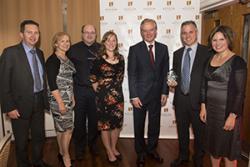
Left right: Colin Ridyard (CHEME), Professor Oliver Turnbull, Pro Vice-Chancellor, who introduced the Award; Lorna Tuersley & Catrin Plumpton (CHEME); Vice-Chancellor, Professor John G Hughes; Dyfrig Hughes (CHEME) & Janine Hughes of Liverpool University.The Centre for Health Economics & Medicines Evaluation (CHEME), School of Medical and Healthcare Sciences conducts research that contribute towards evidence-based policies for new medicines for Wales and the UK.
CHEME’s research has had an impact through informing the decision making process by which new medicines are assessed in the UK (accounting for an annual expenditure of £9bn). The research has also informed the Welsh and Scottish Governments’ decisions to reject the notion of Cancer Drugs Funds. Unlike the NHS in England, where £200m is ring-fenced annually for cancer medicines, policies in Wales and Scotland aim to reduce inequalities in the health service by ensuring that patients with all conditions can access effective treatments.
The Centre also works closely with the All Wales Therapeutics and Toxicology Centre (AWTTC) to conduct health economic assessments of new medicines for Wales. These assessments (over 200 to date) inform decisions made by the All Wales Medicines Strategy Group (AWMSG), and have accounted for £263m in expenditure by the National Health Service (NHS) in Wales for the period 2006-12.
On receiving the Award, Professor Dyfrig Hughes commented:
"Since establishing pharmacoeconomics research within the Centre for Health Economics and Medicines Evaluation at Bangor almost a decade ago, the focus has always been to achieve high quality outputs which impact directly on health policy. I am delighted that we have played a part in shaping some NHS policies and am honoured to receive this award in recognition of these achievements."
The Award for the Best Business Impact went to the BioComposites Centre.
Perhaps one of the worst aspects of the lifestyle we enjoy today is the non-degradable waste produced- and packaging is a significant part of the problem. Working with industry, one strand of research at the University’s BioComposites Centre is getting to grips with the problem by finding alternatives to plastics used in food packaging.
With around 200 million pizzas sold in the UK each year, one significant step in this direction has been achieved with the commercialisation of fibre-based pizza disks to replace the polystyrene disks currently used.
The prototype uses waste straw from the Co-Op’s farms, and has undergone food safety assessment and customer preference surveys. Research partners ValueForm Ltd are now commercialising the packaging with the UK’ largest manufacture of pizzas.
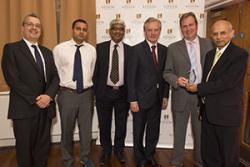 Left-right: Prof David Shepherd, Pro Vice Chancellor who introduced the Award; Jaydeep Korde, ValueFormLtd; Prof Keshavan Niranjan, Reading University; Vice Chancellor, Professor John G Hughes; Rob Elias, BioComposites, Prakash Korde, ValueForm Ltd.Following the successful Technology Strategy Board funded study into the development of novel food packaging; the new fibre based products satisfy strength, flexibility, thickness and water resistance and food contact requirements. They are biodegradable and home compostable and have an improved Life Cycle Assessments compared to expanded polystyrene (EPS), and are commercially viable.
Left-right: Prof David Shepherd, Pro Vice Chancellor who introduced the Award; Jaydeep Korde, ValueFormLtd; Prof Keshavan Niranjan, Reading University; Vice Chancellor, Professor John G Hughes; Rob Elias, BioComposites, Prakash Korde, ValueForm Ltd.Following the successful Technology Strategy Board funded study into the development of novel food packaging; the new fibre based products satisfy strength, flexibility, thickness and water resistance and food contact requirements. They are biodegradable and home compostable and have an improved Life Cycle Assessments compared to expanded polystyrene (EPS), and are commercially viable.
Rob Elias, Director of the BioComposites Centre said:
“Winning this award is fantastic as gaining recognition for the impact of our research is vital for the BioComposites Centre. This is a great example of how we can help companies like Valueform to develop their products and ideas.”
Prakash Korde, Managing Director of ValueForm commented: “Creating a technology platform for the use of annually renewable materials like straw as substitute to paper and plastic in packaging and creating a high value processing regime is Valueform's 21st century sustainable goal.”
The Award comes as the BioComposites Centre celebrates its 25th anniversary year. During that time, the Centre has been at the forefront of research, development and the commercial application of bio-based alternatives to synthetic materials in manufacturing and industry.
The Best Innovation award was presented to the School of Chemistry for their work with Superfix Supplements and Halen Môn.
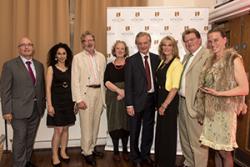 Dewi Hughes, Executive Director, Pontio, introduced the Award, Dr Anna Santoro, (Chemistry), David Lea-Wilson & Alison Lea-Wilson, Halen Môn, Vice Chancellor, Professor John G Hughes, Dr Carol Michael & Paul Hughes, SuperFix Ltd, Dr Vera Thoss (Chemistry)A globally unique product developed especially for elite racehorses, was the result of a chance meeting between two local business owners at an entrepreneurial event held by Bangor University. Both parties had worked with the School of Chemistry, to develop their products, and the School had a crucial role in the development of the new product.
Dewi Hughes, Executive Director, Pontio, introduced the Award, Dr Anna Santoro, (Chemistry), David Lea-Wilson & Alison Lea-Wilson, Halen Môn, Vice Chancellor, Professor John G Hughes, Dr Carol Michael & Paul Hughes, SuperFix Ltd, Dr Vera Thoss (Chemistry)A globally unique product developed especially for elite racehorses, was the result of a chance meeting between two local business owners at an entrepreneurial event held by Bangor University. Both parties had worked with the School of Chemistry, to develop their products, and the School had a crucial role in the development of the new product.
The meeting between Superfix Supplements Ltd and Halen Môn resulted in the successful launch onto the global market of a new therapeutic product from a local industrial by-product. 75% of all 2 and 3 year old Racehorses suffer from orthopaedic disease with an estimated cost of £77 million to the racing industry. The very simple solution was to formulate a transdermal leg spray and a mineral treatment to be added to an equine spa. The leg spray contains strontium to increase bone density and sulphur to relieve pain.
The role of the School of Chemistry was crucial in providing chemical analysis that determined the composition of the bi-product to a sufficiently detailed level to be used for product development. Halen Môn had previously analysed their bi-product using a contract laboratory, however, Dr Vera Thoss at the School of Chemistry re-analysed and interpreted the data so that the information could be used by both Halen Môn and Superfix Supplements, leading to the first product of its kind on the market, which is easy to apply and has a UK-based supply line.
Carol Michael, Co-Director at Superfix commented:
‘This is an excellent example of what can be achieved when businesses and academia work together, the result is a that a high end and very specialist product is released onto the market in a remarkably short time’
Dr Vera Thoss of the School of Chemistry commented:
“Innovation requires knowledge for what is needed and the skill to chemically assess what it there. In the case of the collaboration between Halen Môn, Superfix Supplements and the WISE Network, the chemical analysis of the bi-product and its interpretation were crucial for product development. It has been a pleasure to work with both companies, to increase the understanding of their manufacturing and contribute to their overall product portfolio.”
Others on the shortlist were: School of History, Welsh History and Archaeology; Fisheries and Conservation Science Group, School of Ocean Sciences; Institute for Competition and Procurement Studies (ICPS) at the School of Law, shortlisted for two Awards; the Organic Electronics Research Group, School of Electronic Engineering; the School of Psychology, shortlisted for two Awards and PONTIO and the Careers & Employability Service.
4 images are available- please request from press@Bangor.ac.uk
Captions:
Filename RayDaviesNDF4332:
Best Cultural and Societal Impact went to The Photonics Academy of Wales @Bangor (PAWB).
Left-right: Louise Jones, of the Photonics KTN Network; John Blomfield, from partners, Qiopitq; Laurel Hopkins, Opus Support Officer; Vice Chancellor, Professor John G Hughes; Ray Davies of @PAWB; Carl Tully, Pro Vice-Chancellor, who introduced the Award; and representing partner schools, Huw Smith, Head of Physics at Ysgol Friars, Bangor. ( Professor Alan Shore could not be present and commented by e mail).
Filename Dyfrig HughesNDF4337:
ESRC Impact Acceleration Award (IAA) Best Impact on Public Policy and/or Public Services Award was presented to the Centre of Health Economics & Medical Evaluations (CHEME) at the College of Health Sciences. Left right are: Colin Ridyard (CHEME), Professor Oliver Turnbull, Pro Vice-Chancellor, who introduced the Award; Lorna Tuersley and Catrin Plumpton (CHEME); Vice Chancellor, Professor John G Hughes; Dyfrig Hughes (CHEME) and Janine Hughes of pa partner research group at Liverpool University.
Filename; RobEliasNDF4339:
The Award for the Best Business Impact went to the BioComposites Centre.
Left- right Professor David Shepherd, Pro Vice Chancellor, who introduced the Award; Jaydeep Korde of project partners, ValueFormLtd; Prof Keshavan Niranjan of Reading University; Vice Chancellor, Professor John G Hughes; Rob Elias, Director of the BioComposites Centre at Bangor University; and Prakash Korde, Managing Director of ValueForm Ltd.
Filename veraThossNDF4345
The Best Innovation award was presented to the School of Chemistry for their work with Superfix Supplements and Halen Môn. left-right: are Dewi Hughes, Executive Director of Pontio, who introduced the Award, Dr Anna Santoro, School of Chemistry, David Lea-Wilson & Alison Lea-Wilson of Halen Môn, Vice Chancellor, Professor John G Hughes, Dr Karen Michael and Paul Hughes Co-Directors of Superfix Supplements Ltd and Dr Vera Thoss of the School of Chemistry.
Publication date: 11 July 2014
